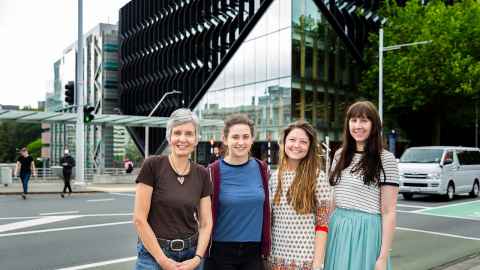Solutions to a sustainable future
3 December 2018
What do you get when you combine bright minds with a focus on the future, a well communicated piece of research, coupled with strong mentorship, and help towards living costs?

With the support of the Faculty of Science Sustainability Research Award, four young scientists are forging their own path by creating research that focuses on sustainability initiatives relating to each of their disciplines.
Eleanor Kearns, India Merrick, Mallory Sea and Polly Holland are recipients of the award, which aims to encourage student projects on issues related to human wellbeing and ecological flourishing within the University and the wider community.
While science isn’t always synonymous with sustainable practice, it is becoming more so. Certainly, the next generation of scientists have a very strong motivation to ensure their science is in fact sustainable, transparent and inclusive.
Polly Holland, who is studying for a Master of Science in Environmental Science, is very aware that her worldview of sustainability has changed significantly since progressing into postgraduate study.
“My undergraduate studies were in biology and chemistry and we learnt a lot about the prospects of technology, such as genetic engineering and chemical innovations, to combat societal issues,” she says. “Technological innovation is amazing, but I suspect that over-reliance on technical solutions gives us a false sense of security that we don’t have to change our behaviour.”
It is a sentiment shared by her fellow awardees. Eleanor Kearns, who is in the final stages of completing her Bachelor of Science (Honours) in Chemistry, is amazed at how little she knew before studying courses in green chemistry as an undergraduate student.
“I had no idea how unsustainable chemistry could be, or any of the interesting ways people are combatting it by focusing their chemistry on sustainable practices that address worldwide sustainability issues,” says Eleanor, who is researching how the synthesis of novel donor materials can help improve the efficiency of solar conversion technologies and thus reduce their cost.
Marine Science masters students, India Merrick and Mallory Sea, have focused their attention on the marine environment.
India's research looks at establishing marine reserves, a vital tool used to preserve and protect our biodiversity. She has created a species presence database and multivariate statistical analysis can be used to provide graphs that allow these large datasets to be easily viewed, and used as a supplementary tool in future marine reserve establishment processes to increase the sustainability of our fisheries.
Mallory Sea, who comes from the landlocked state of Iowa in America, discovered the ocean while on a student exchange programme in coastal Panama. And yes, her name is really Mallory Sea – a variant surname courtesy of her Swedish ancestors.
Mallory is about to begin her research into New Zealand’s endemic green-lipped mussels and one of their major predators, the eleven-armed sea star. She aims to show how different spatial arrangements of mussels in their mussel beds will effect predation rates.
It is fascinating to see how everyone’s research differs. Environmental scientist Polly is tackling the complex issues of social, institutional and political barriers that inhibit change toward a sustainable model with her topic, ‘Pipe Dreams and Dirty Streams’.
“With respect to water quality, a lot of environmental degradation is a result of the infrastructure built into our cities,” she says. “For example, our traditional storm water networks that protect us from flooding, infrastructure damage and protect our health and safety, also lead to a myriad issues such as altered stream morphology, sedimentation, and pollution in the runoff – all impacting the aquatic life in the receiving waterways.”
Consequently, Polly is using a case study of Auckland’s proposed Central Interceptor project to understand how large-scale, centralised infrastructure is legitimised in an age with increasing calls for sustainability and environmental awareness.
Heady stuff! And Dr Anna Santure, from the School of Biological Sciences, who, along with colleague Dr Bruce Burns, assessed the Sustainability Award applications, is not surprised.
“I have a feeling that the applications we’ve received so far have been from students who are already fairly well versed in living sustainable lives,” she says with a smile. “We hope to raise the profile of sustainability at the University through these awards, and send a signal to our students about the value and importance of sustainability research as they begin to plan their postgraduate projects.”
The Faculty of Science Sustainability Network, which runs the awards, is now in its fourth year. There are over 100 staff in the wider network with Dr Niki Harré, Associate Dean Sustainability, instrumental in galvanising the working group to formalise such initiatives as the reduction of waste management at the Science Centre, composting throughout the faculty, and the development of interdisciplinary teaching collaborations, such as a new three-course sustainability module available to undergraduate students.
While the University establishes itself as a national leader in sustainability research and teaching, the Faculty of Science Sustainability Research Award is creating an interdisciplinary network of new researchers armed with the skills, experience – and the science – to create positive, progressive and sustainable change.
Learn more about the Faculty of Science's commitment to sustainability, through the work of the Faculty of Science Sustainability Network.
inSCight
The article appears in the December 2018 edition of inSCight, the print magazine for Faculty of Science alumni.